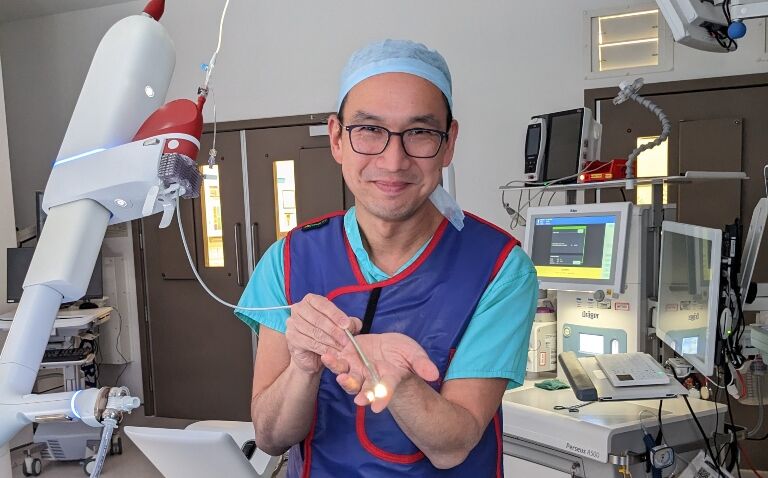A robotic-assisted bronchoscopy system is being used in the UK for the first time in a move that could help to transform the early diagnosis of suspected lung cancer by improving precision and speed when taking tissue biopsies of lung nodules.
NHS clinicians at the Royal Brompton Hospital and St Bartholomew’s Hospital are participating in a clinical study to determine if the Ion Endoluminal System (Ion), which was developed by the robotic-assisted surgery company Intuitive, could benefit patients and the NHS.
Each hospital site will aim to recruit around 50 patients with small lung nodules located in areas that are challenging to reach via traditional bronchoscopy.
Ion uses unique shape-sensing technology and robotic assistance to allow clinicians access to deep and hard-to-reach areas in each of the 18 segments of the lung. This means tissue samples can be removed for biopsy with greater precision and accuracy.
During a procedure with the Ion system, a physician inserts the Ion, fully articulating the catheter into the patient’s lung via the mouth and throat through an endotracheal tube, which may have fewer complications than biopsy approaches that use a needle inserted from outside the body.
Transforming early diagnosis
Kelvin Lau (pictured), consultant thoracic surgeon for St Bartholomew’s Hospital, said: ’The UK is leading the world in rolling out a national lung cancer screening programme. However, only some of the lung nodules identified during screening are cancerous and need treatment. Current biopsy techniques carry risk and are not always accurate, and many patients end up waiting for a repeat scan. The uncertainty of the wait causes anxiety and could allow a cancer to grow and spread.
’With this shape-sensing robotic technology, I have the precision and stability to lock onto a very small lung nodule and obtain an accurate biopsy quickly and safely. This could transform early diagnosis and treatment, reduce the need for repeat scans and treat lung cancer earlier.’
Also commenting on the ’transformative’ technology, Professor Pallav Shah, consultant respiratory physician based at Royal Brompton Hospital, added: ’We know that an earlier diagnosis of lung cancer leads to significantly improved outcomes for our patients. When we see patients with cancerous lung nodules of more than 30mm, their five year survival rate is around 68%, but if we are able to detect these nodules at a smaller size, when they are less than 10mm in size, we are looking at a 92% survival rate.’
There are already over 400 Ion systems installed in US hospitals, and Intuitive continues to explore its applications in other countries including in the UK, across Europe and beyond.










